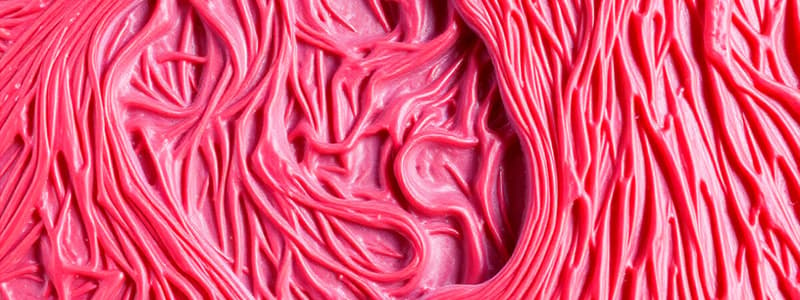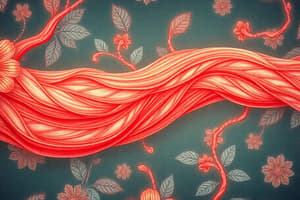Podcast
Questions and Answers
Which characteristic is unique to cardiac muscle fibers compared to skeletal and smooth muscle fibers?
Which characteristic is unique to cardiac muscle fibers compared to skeletal and smooth muscle fibers?
- Striated appearance
- Multinucleated structure
- Branched structure with intercalated disks (correct)
- Involuntary contraction
What is the primary function of smooth muscle tissue?
What is the primary function of smooth muscle tissue?
- Voluntary movement of skeletal bones
- Controlling movement within hollow organs and blood vessels (correct)
- Pumping blood throughout the body
- Maintaining posture against gravity
Which of the following best describes the structure of skeletal muscle fibers?
Which of the following best describes the structure of skeletal muscle fibers?
- Striated and tubular, with multiple nuclei (correct)
- Cylindrical and uninucleated
- Flat and arranged in sheets
- Branched with intercalated disks
How do skeletal muscles contribute to body temperature maintenance?
How do skeletal muscles contribute to body temperature maintenance?
What role does the neuromuscular junction play in muscle fiber contraction?
What role does the neuromuscular junction play in muscle fiber contraction?
Which pathway is the simplest and fastest way for muscle to make ATP?
Which pathway is the simplest and fastest way for muscle to make ATP?
What protein in muscle cells delivers oxygen directly to the mitochondria?
What protein in muscle cells delivers oxygen directly to the mitochondria?
Study Notes
Energy for Muscle Contraction
- Muscles utilize four energy sources: glycogen and triglycerides stored within the muscle, and glucose and fatty acids acquired from the blood.
- The source of energy used depends on the intensity and duration of exercise.
- As exercise duration increases, reliance on muscle energy stores decreases, and reliance on energy sources from the blood increases.
Sources of ATP for Muscle Contraction
- Muscles store limited amounts of ATP
- Muscle cells produce ATP through three primary pathways: creatine phosphate (CP) pathway, fermentation, and cellular respiration.
- The CP pathway and fermentation are anaerobic, meaning they do not require oxygen. Cellular respiration is aerobic, requiring oxygen.
The Creatine Phosphate Pathway
- The CP pathway is the simplest and fastest way for muscles to produce ATP.
- Creatine phosphate is formed only when a muscle cell is resting.
- The CP pathway powers the initial few seconds of muscle contraction.
- The CP pathway provides approximately 15 seconds worth of energy before another energy source must be utilized.
Fermentation
- Fermentation is an anaerobic process involving glycolysis and fermentation.
- Fermentation produces two ATP molecules from the breakdown of glucose to lactate.
- Lactate buildup causes short-term muscle aches and fatigue.
- Oxygen debt, characterized by heavy breathing after strenuous exercise, is required to metabolize lactate and restore cells to their original energy state.
Cellular Respiration
- Cellular respiration is the slowest but most efficient method of ATP production.
- Cellular respiration occurs in the mitochondria.
- Myoglobin, a protein in muscle cells, delivers oxygen directly to the mitochondria.
- Cellular respiration can utilize glucose from stored glycogen, glucose from the blood, and fatty acids.
Studying That Suits You
Use AI to generate personalized quizzes and flashcards to suit your learning preferences.
Related Documents
Description
Test your knowledge on the unique characteristics and functions of different muscle types, including cardiac, smooth, and skeletal muscle fibers. Explore topics such as muscle structure, body temperature maintenance, and the neuromuscular junction's role in contraction.



